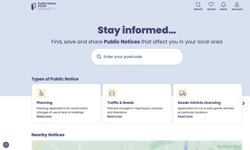When the internet got started we thought it was another medium. There was print, there was radio, there was TV – and there was the internet. A nice simple way of seeing the world.
But these simple demarcations are increasingly being thrown in to doubt. Podcasting has arrived – and is that radio? Or an addition to the print medium? Or something else entirely?
Podcasting – distributing multimedia files over the internet via RSS web feeds – really started to take off in 2004. At first it was mainly amateurs podcasting – some acquiring massive audiences – but now the mainstream media has started to join in. A survey by the AOP showed that half the association's members planned to launch podcasts in the next twelve months. 35 percent have launched already.
The BBC has already started podcasting its radio broadcasts. Sarah Prag, senior project manager for Radio and Music Interactive, says they started with 20 podcasts and soon expanded it to 50 covering a wide range of content. While some whole programmes are being podcast, other podcasts are made up of selected highlights, as well as some selections of the speech portions of music programmes.
But, because of rights issues, BBC podcasts are only available for seven days after the date of the broadcast – though, unlike with streaming media, once users have downloaded the podcast, they can keep it as long as they want. And, again unlike streaming media, users can listen to the file on any device, and don't have to be connected to the internet at the time.
The podcasts have been popular. Sarah Prag says 1.7 million downloads were made in February 2006, and that number has been increasing rapidly.
But there are some issues with what distinguishes a podcast from any other downloaded media file. For a start, says Alex White of the AOP, "a podcast is a regular thing not just a plain old download." So far, the BBC qualifies. But Richard Withey of the Independent believes there's another criterion too. "You've got to have archives," he says, "it has a life beyond the download."
Other broadcasters, such as GCAP Media and Chrysalis, are also getting into the act – Chrysalis with a paid-for LBC podcast subscription as well as basic free services. And so are the print media.
National newspapers
The national newspapers have really taken off with blogging and podcasting – particularly the quality press. The Telegraph, however, started poorly with a rather unimaginative approach - journalists basically reading out their columns. It was duplicated content, and it was badly presented. Now, wherever new media people are gathered together, someone will slag off the original Telegraph podcasts. The appointment of Guy Ruddle - a broadcaster not a print journalist – has turned it around.
But the real success in national papers' podcasting was a totally unexpected one – the Guardian's Ricky Gervais show, billed as 'thirty minutes of pure drivel'. That scored over 1m downloads in its first month – and it's been such a success that it's now gone paid-for.
In fact, Richard Withey believes that "podcasting works better for discrete features and soft editorial than it does for hard news." Not everyone will agree with him on this, but his feeling is that travel and lifestyle are particularly well suited to the podcast format. The Independent's first major podcast was a travel feature on Barcelona – and the Guardian is producing a series of podcasts on the German cities hosting the World Cup, which seems to back up his assertion.
Sarah Prag believes that it's the less staid podcasts that will catch listeners' imagination. She says that "newspapers need to look at what they have got that people might want access to in a new way – quirky stuff rather than listening to a load of journalists around a table." To some extent, the Telegraph did the same thing with its earlier podcasts that most publishers did with moving on to the internet – they started out trying to migrate print content on to pixels, and only later found out which content suited which medium.
While the nationals have started to exploit podcasts, fewer local papers are podcasting. The Liverpool Daily Post is leading the field with a weekly business podcast, featuring an interview with a local business leader. Bill Gleeson, business editor, sees the podcasts as a great way to extend the brand. His paper has just run a profile on Steven Broomhead, chief executive of the North West Development Agency – at the same time as podcasting an interview with him on the site. Also, says Bill, "the podcasts cross over with print content – if someone says something interesting on the podcast, you can use that as the basis for a news article."
Some consumer magazines are now beginning to use podcasting extensively, too. Will Currie of Emap believes that "we are living in an age of pull media," where the user is in control, and that podcasts are best suited to support this style of interaction. He is proud of what has been achieved at Kerrang!, where "podcasting is becoming the mainstream for this audience" of 16-24 year olds.
But B2B media still hasn't really taken up the challenge of podcasting. There are some isolated centres of excellence – New Scientist has a particularly good podcast which lightens up what can be a rather heavy text experience. But, as Alex White says, "podcasting is still predominantly led by the consumer media."
However, it's intriguing that podcasting isn't being used more on the specialist side. Because of its relatively low costs and scalable nature, as well as the fact that it's 'pull' not 'push', podcasting is well suited to specialised, niche markets. Alex White says that "niche content really finds a platform with podcasting" - so it's odd that, so far, its main deployment has been in the mass media. Perhaps that will change over the next year or so.
Low cost
Podcasting is cheap. Kerrang! needed only one additional member of staff to start podcasting. Bill Gleeson says "Trinity invested very considerably in web technology a few years ago, so there's not a huge amount of extra investment required to podcast. You can get yourself started reasonably cheaply."
Richard Withey concurs; "if you're using RSS and XML already, the cost is minimal. It's not a huge investment, and it extends our reach and our brand." But, he warns, "you need the skills to do what is effectively radio broadcasting," and not all print journalists have them. The lack of relevant skills is also identified by Alex White as a reason some print media are reluctant to enter the podcast booth.
She believes that the lack of a clear business model is another barrier. Most podcasts are free – so that, though they enhance the reader's experience, they're not going to pay their way. Bill Gleeson says "Commercially, podcasting is a very long burner – revenues aren't going to gush in immediately."
However, sponsorship is now becoming common – the Independent's Barcelona podcast was sponsored by Vodafone, for instance, and Creation Podcasting, part of GCAP Media, is also putting together sponsored podcasts. Alex White says "Sponsorship is one of the clearest business models at the moment. Podcasts might not offer the hugest numbers, but do give a very specialist and dedicated audience for an advertiser."
Who’s listening?
The big question, of course, is – who's listening? And the answer to that is that we don't really know. Sarah Prag says, "One of the frustrations we have is that it’s quite difficult to track podcasting in terms of the demographic. People are subscribing on third party sites or feeds such as iTunes," which don't always share their data. For instance Apple won't share its data with publishers. That's very different from people accessing your website directly, in which case you know just what they're doing.
There are some ways round this. Audible, for instance, is another aggregator which does allow publishers to track their downloads more accurately. Otherwise, focus groups can help track the specific demographics.
Steve Cooke, of BMRB, says data is now available showing the age distribution of podcast listeners. And, it's not quite what might be predicted. "What we found is there's a bit of a spike in the 16-24s, then a dip, then another spike again in the over 35s. Everyone who's rediscovering their vinyl tracks on mp3!"
Sarah Prag also warns against believing their podcasts only apply to youngsters. She says, "Any stereotypes we might have had have been blown out of the water." The second and third most downloaded BBC podcasts are ‘In our Time’ and ‘From Our Own Correspondent’ - so that probably indicates the demographics are pretty broad.
Is podcasting here to stay? Richard Withey believes so. "It's here to stay but not in this format, necessarily. Distributing content through personal devices is here to stay, and timeshifting is here to stay." His bet is that vodcasting (podcast video rather than audio) will become more prominent over the medium term - "We're a television generation, now we're an internet generation too."
And, there doesn't seem to be any opposition to podcasting. Unlike the early days of the internet, when the attitude of some print media was to ignore it and hope it would go away, most publishers appear to be actively welcoming podcasting.
Most importantly, the journalists are enthusiastic. Bill Gleeson says, "I'm a print journalist by background, but I've been enjoying doing the podcasting – it's good fun." With such enthusiasm, how can podcasting not flourish?
FEATURE
Radio stars
The boundaries between media continue to blur. Publishers are now comfortable with the fact that their content might not be read on paper but from screen, and now they are getting used to the fact that their content might not be read at all – but listened to. As publishers start to morph into broadcasters, Andrea Kirkby takes a look at podcasting.










